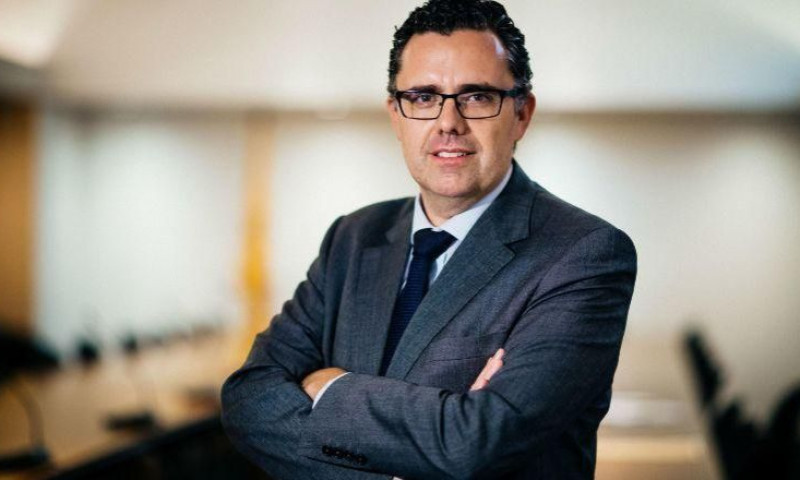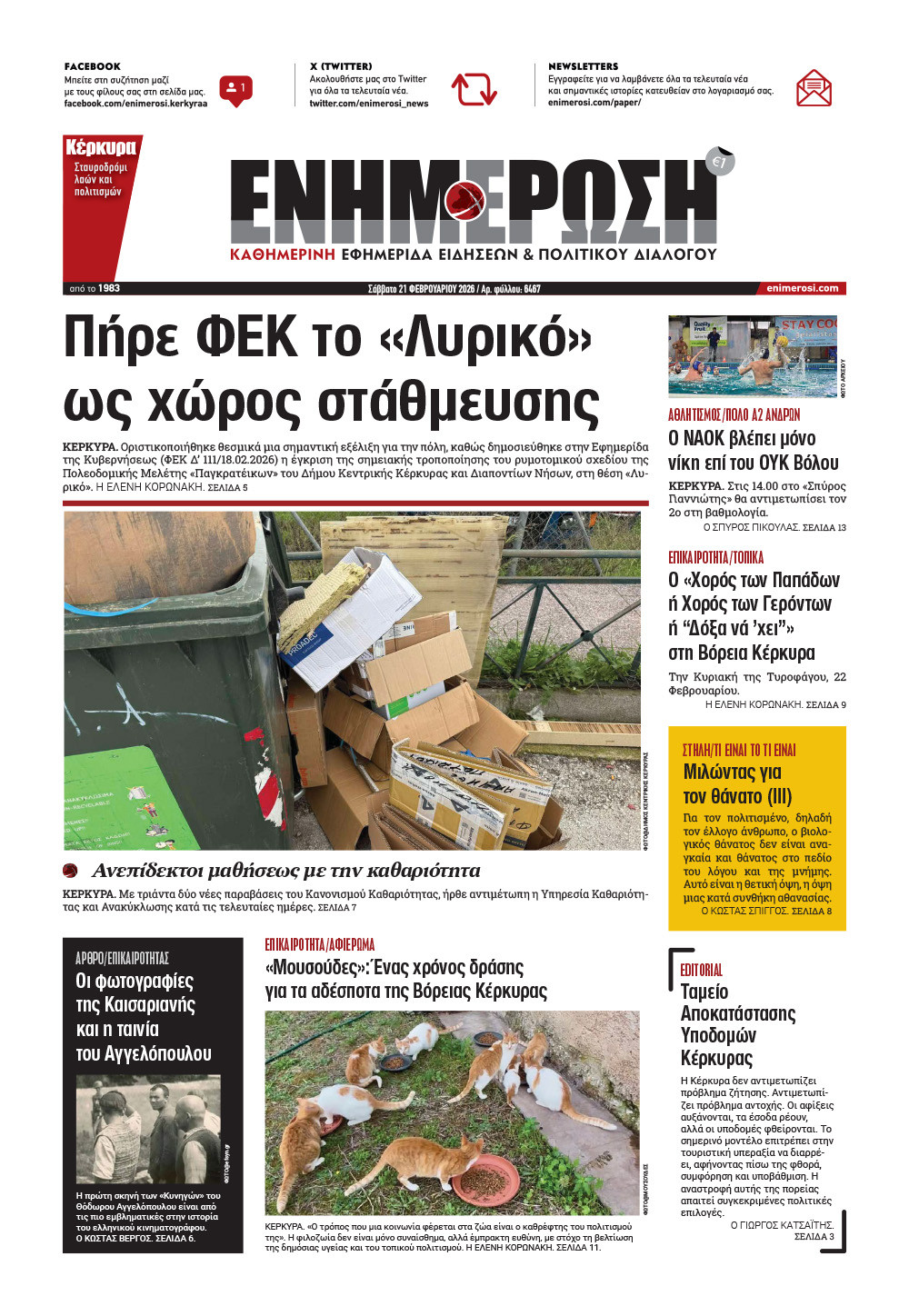The example of Catalonia and a change of direction for Corfu

Catalonia
27 Nov 2019
/ 10:48
CORFU. The Director of the Catalonia Waste Management Organisation Josep Maria Tost i Borras describes how Catalonia managed its waste and is considered to be one of the most successful European models.
Following the recent developments regarding waste management and the unanimous decision by DIADYMA to accept waste from Corfu, the Mayor of Central Corfu & Diapontia Islands Meropi Ydraiou stated that she doesn't want this solution to result in complacency but to be a fresh start focussing on recycling and sorting at source.
A few weeks ago Waste Watch Corfu organised an international meeting about waste management on a European level. One of the guest speakers was Josep Maria Tost i Borras, Director of the Catalonia Waste Management Organisation, who gave Enimerosi an exclusive copy of his report in which he describes how Catalonia managed its waste and is considered to be one of the most successful European models.
Similarities between Catalonia and Corfu and the State as a development pillar
Catalonia has a population of 7.53 million and comprises 947 Municipalities and 42 Regions. In common with Corfu it is a leading tourist destination with 24 million tourists every year. 25 years ago it had a huge problem with its waste. There was only collection of mixed waste which was deposited in unmanaged dumps and then either burnt or covered without any kind of control. The way in which waste was managed in Catalonia led to public health problems, air, water and ground pollution as well as public distress and continuous complaints.
A significant step that Catalonia took was to treat refuse as a resource and not as waste - they reckoned that with their new strategy new jobs would be created and tourism and the economy would be boosted. According to the former Mayor of Tarragona Josep Maria Tost i Borras, a necessary element in order to move forward was the contribution from the State - specifically, political will, agreement and state funding. Approximately 850m Euros was given for infrastructure and 150m to the local authorities. The establishment of an organisation for Catalonia Waste Management in 1993 was a fundamental element as it employed over 200 public employers working to improve waste management.
"Carrot and stick"
Catalonia's greatest success, however, in waste management was sorting at source - mainly with organic waste (biowaste). In 1993 sorting at source in Catalonia was at the level of 1.7% but by 2017 it had rocketed to 41.8%. Out of the 947 Municipalities in Catalonia the level of sorting at source in 244 of them is greater than 50% and in 100 greater than 60%.
What was especially successful in Catalonia was the policy of 'carrot and stick' - with punishment and encouragement, as the former Mayor calls it. A 41.3 Euro tax was imposed on each landfill and 20.6 Euros for incineration and since this measure was adopted there was an income of 560m Euros, of which 537m was returned to the local authorities. From 2020 to 2035 there will be tax increases of between 3 and 5 Euros per ton for the landfills. This particular tax significantly helped to increase sorting at source.
Catalonia has managed to achieve a high level of sorting at source and especially in Municipalities which successfully implement the programmes such as 'Door-to-door' and 'Polluters pay'. In these areas the level of sorting at source is between 60 and 80%. It also managed to reduce the use of plastic bags to 50% and tackled the issues of food waste and sea waste.
In all these efforts significant roles were played by Governments, local authorities, universities, companies and research centres. The waste sector in Catalonia accounts for over 7% of GDP with over 150 companies being created providing employment for over 20,000 people with a potential to develop even further.
After 25 years the situation has changed and the waste management system is properly controlled, resulting in clean, living beaches and forests in Catalonia.
Catalonia can be an example to Corfu as it demonstrates a policy that can be implemented.
A few weeks ago Waste Watch Corfu organised an international meeting about waste management on a European level. One of the guest speakers was Josep Maria Tost i Borras, Director of the Catalonia Waste Management Organisation, who gave Enimerosi an exclusive copy of his report in which he describes how Catalonia managed its waste and is considered to be one of the most successful European models.
Similarities between Catalonia and Corfu and the State as a development pillar
Catalonia has a population of 7.53 million and comprises 947 Municipalities and 42 Regions. In common with Corfu it is a leading tourist destination with 24 million tourists every year. 25 years ago it had a huge problem with its waste. There was only collection of mixed waste which was deposited in unmanaged dumps and then either burnt or covered without any kind of control. The way in which waste was managed in Catalonia led to public health problems, air, water and ground pollution as well as public distress and continuous complaints.
A significant step that Catalonia took was to treat refuse as a resource and not as waste - they reckoned that with their new strategy new jobs would be created and tourism and the economy would be boosted. According to the former Mayor of Tarragona Josep Maria Tost i Borras, a necessary element in order to move forward was the contribution from the State - specifically, political will, agreement and state funding. Approximately 850m Euros was given for infrastructure and 150m to the local authorities. The establishment of an organisation for Catalonia Waste Management in 1993 was a fundamental element as it employed over 200 public employers working to improve waste management.
"Carrot and stick"
Catalonia's greatest success, however, in waste management was sorting at source - mainly with organic waste (biowaste). In 1993 sorting at source in Catalonia was at the level of 1.7% but by 2017 it had rocketed to 41.8%. Out of the 947 Municipalities in Catalonia the level of sorting at source in 244 of them is greater than 50% and in 100 greater than 60%.
What was especially successful in Catalonia was the policy of 'carrot and stick' - with punishment and encouragement, as the former Mayor calls it. A 41.3 Euro tax was imposed on each landfill and 20.6 Euros for incineration and since this measure was adopted there was an income of 560m Euros, of which 537m was returned to the local authorities. From 2020 to 2035 there will be tax increases of between 3 and 5 Euros per ton for the landfills. This particular tax significantly helped to increase sorting at source.
Catalonia has managed to achieve a high level of sorting at source and especially in Municipalities which successfully implement the programmes such as 'Door-to-door' and 'Polluters pay'. In these areas the level of sorting at source is between 60 and 80%. It also managed to reduce the use of plastic bags to 50% and tackled the issues of food waste and sea waste.
In all these efforts significant roles were played by Governments, local authorities, universities, companies and research centres. The waste sector in Catalonia accounts for over 7% of GDP with over 150 companies being created providing employment for over 20,000 people with a potential to develop even further.
After 25 years the situation has changed and the waste management system is properly controlled, resulting in clean, living beaches and forests in Catalonia.
Catalonia can be an example to Corfu as it demonstrates a policy that can be implemented.











